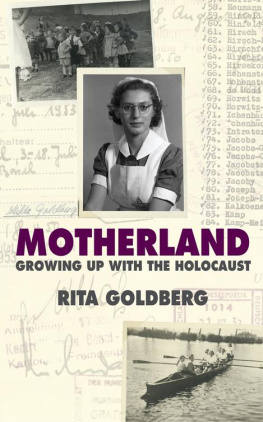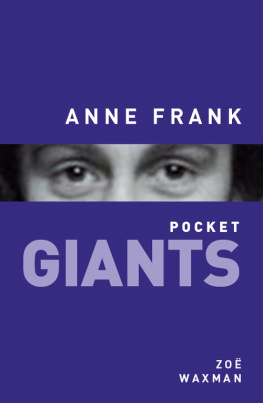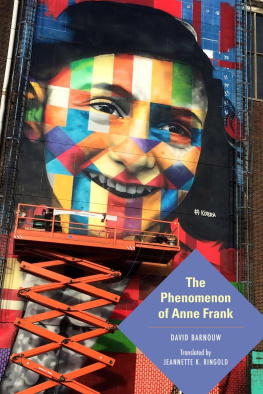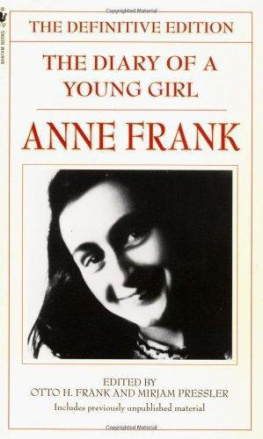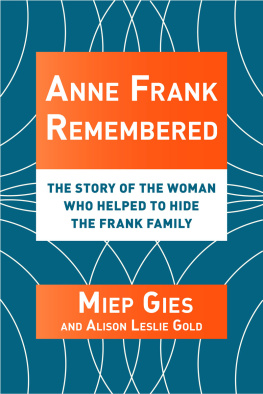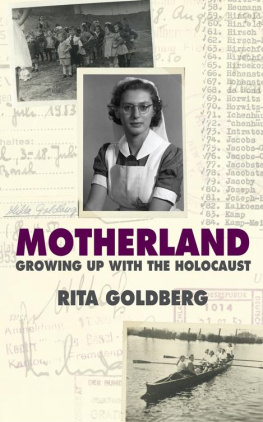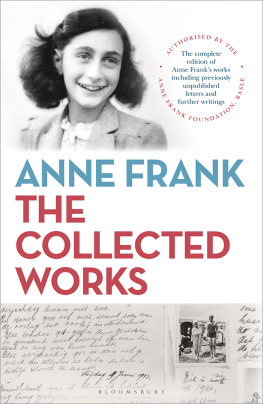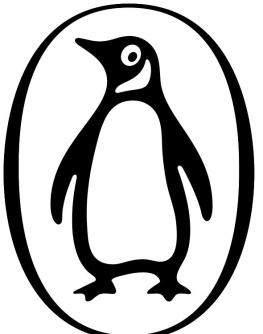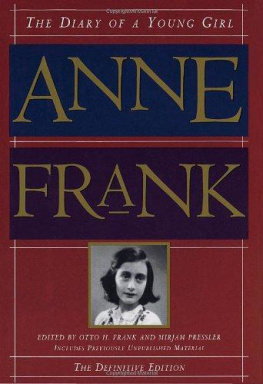I HAVE BARELY started, and already I feel like an Oscar nominee fearful of leaving people out. First thanks must go to my mothers rescuers: Zus and Joop Scholte, in Amsterdam, and Robert Dupuis and family in the Ardennes of Belgium. Without them my mother would probably not have survived, and there would be no marriage, no children and no story. They should have been inscribed among the Righteous of All Nations at Yad Vashem in Jerusalem, but for some reason that never happened, possibly because of my mothers habit (so like my own) of jettisoning the past like a booster rocket on her voyage through life. I hope that this book will make some amends, especially to Kiki Scholte, the youngest daughter of the Dutch family, who has been a friend all these years.
I mention Yad Vashem, but other museums also appear quite a bit in this book, not only because people working there have kindly helped me with research, but also because museums make concrete what so many survivors children have internalized. I would like to say, though, that my mothers life with the rescuers, and with other survivors during and after the war, was not museum-like at all: she drew emotional nourishment from their warmth, joy and sense of fun. Some of the postwar pictures included here give an inkling of their vitality, as well as of their heroism.
My closest friend, Ilene Neuman, should be thanked too, though she died of breast cancer long ago. Ilene knew my story from the inside. She was a year older and came from my hometown, Teaneck, New Jersey, though I didnt know her in high school. From the moment we met during my first weekend in college, we were nearly inseparable. Her father had survived the camps, and we had in common our recognition of the existential absurdity of our position. When things got tough, our mantra was always: Well, at least its not Auschwitz! followed by explosive laughter (Ilene, like my mother, was an excellent laugher). When she was dying in Palo Alto, California, I called as much as I could, and visited a week before her death. At that point in 1995, the year she died at forty-seven, her cancer had metastasized to her brain and bones. She had constant pain and nosebleeds, though her intellect was intact right until the end. Her family, under the stress of her illness, was in disarray. Its still better than Auschwitz! she said. In a horrible way it was better, and she knew it. Auschwitz didnt even let her experience her own suffering fully. I miss her to this day and wish that she were here to celebrate this memoir with me.
Among the living, family and friends come first in the order of gratitude. My parents, Max and Hilde, are still living together in Teaneck and eager to see this apparently endless project appear in print. My sister Dot recorded long interviews with our mother in 1983, and the typescript of these became the basis for my own interviews much later on. Dot and my middle sister, Susie, have offered unwavering love and support from the beginning, when they read the first version of the memoir.
Oliver, Benjamin, Daniel and his wife Ellen and their two little boys, Gabriel and Jamie, are the delight of my life and have made me a happy writer even when the work has been sad. They (at least the adults) and other members of the extended family nieces Heather Brubaker and Rebecca Ross Russell, and Beckys father, David Ross Russell read the manuscript at various points. The entire clan, including cousins in Switzerland, Israel and the Philippines, has been a source of loving strength, and I recognize my good fortune in having them.
Special thanks go to two people whose intellectual support has been essential. My husband, Oliver Hart, has been everything writers usually mention at the very end of the acknowledgments. We have been married nearly forty years, and he has been patient, loving, hilarious and generally adorable. He has also been a challenging reader and fastidious editor even when he had to grit his teeth to plow through yet another version of a chapter. My son Benjamin Hart, who is a professional in these matters, has edited several versions of the manuscript down to the one now in print. His love of language and his grasp of structure and logic are amazing, and his comments have been astute and characteristically witty. He also gave me the title of my book.
Warm thanks as well to Myra McLarey and Steve Prati, who have been insightful readers, commentators, cheerleaders and beloved friends. Im grateful for the help, interest and unflagging kindness of many people in Lexington and Cambridge, Massachusetts and abroad, only a few of whom Ill name here: Steven Cooper; my close friend, Pat McFarland, who died before she could see the published book, and her husband Philip McFarland; John Gledson; Ruthy and Elhanan Helpman; Linda Jorgenson; Eva Simmons; Esther Silberstein; Ali Butchko; colleagues at the Department of Comparative Literature at Harvard; and the now-defunct Porch Table writers group in Cambridge, MA, the brainchild of Elena Castedo and of which Myra, above, Gregory Maguire (to whom thanks as well) and I were members.
I would like to thank the many archivists, historians and researchers who have helped me some for years, some more recently. These include the incomparable Genya Markon, who as Director of Photo Archives first contacted my mother on behalf of the United States Holocaust Memorial Museum. She has, regrettably, semi-retired, though she still does work on behalf of the Museum in Israel. She gathered photographs and interviews for the Museum, where they are in safe hands, and she introduced my mother to other scholars. Dutch researchers from NIOD (the Institute for War, Holocaust and Genocide Studies) and from Dutch Public Television, both based in Amsterdam, the Netherlands, include Matthijs Cats, Gerard Nijssen, Ren Kok, Ren Pottkamp, Erik Somers, the late Eric Nooter (who worked in New York) and Ad van Liempt. Several of these historians also participated in making a television program about my mother that aired in the Netherlands in 2003. They generously shared major discoveries from their archives, and I have been able to use these in the book. An Huitzing and Monica Kaltenschnee, from the Stichting Annemie en Helmuth Wolff, recently discovered a cache of wartime photographs and out of the blue sent me three formerly unknown pictures. The cover portrait of my mother at eighteen, in her nurses uniform, comes from that collection.
Thanks go also to Elisa Ho of the Jacob Rader Marcus Center of the American Jewish Archives in Cincinnati, Ohio; to Lynn Fleischer, of the Annette Levy Ratkin Jewish Community Archives in Nashville, TN; to Reuma Weizmann (wife of the former president of Israel), though indirectly, because she sent her unpublished memoir to my parents; to David Delfosse, of Paris, who is working on a book that prominently features my uncle Jo; and especially to Megan Koreman, a brilliant historian who generously shared information about Jo and his underground connections in Belgium. Her meticulously researched http://dutchparisblog.com allowed me to find some information online, but she was generous with advice and further commentary as well.
Karen Packard, Theresa Norris and Alicia Peters of Wales Copy Center in Lexington MA have helped me over many years with printing and illustrations in all kinds of complicated permutations. Judy Stewart, my copy-editor, and Michelle Levy, the books designer, have been a delight to work with and have taken care to minimize error and please the eye.

